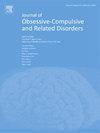Associations between emotion regulation, symptom severity, and affect in obsessive-compulsive disorder
IF 1.5
4区 医学
Q3 PSYCHIATRY
Journal of Obsessive-Compulsive and Related Disorders
Pub Date : 2025-01-01
DOI:10.1016/j.jocrd.2024.100934
引用次数: 0
Abstract
Previous cross-sectional, retrospective studies have shown associations between dysfunctional emotion regulation (ER) and obsessive-compulsive (OC) symptoms. No studies to date have, however, used intensive longitudinal designs to assess the theoretically proposed, yet empirically understudied dynamic relations between momentary OC symptoms, affect, and ER. Up to six times a day across six days, n = 68 individuals with OCD and n = 43 mentally healthy controls reported engagement-oriented and avoidance-oriented ER strategies, self-perceived ER effectiveness, negative and positive affect, and OC symptoms. We investigated associations between ER behavior and current outcomes (i.e., affect or symptoms in the moment) as well as subsequent outcomes (i.e., 1–2 h later). Results showed that higher-than-usual self-perceived ER effectiveness was associated with higher current positive affect and lower current negative affect and OC symptoms. Use of avoidance-oriented ER strategies was also partly associated with less beneficial outcomes. Effects for engagement-oriented ER strategies were mostly non-significant, except from a negative association with subsequent OC symptoms. All other associations with subsequent outcomes did not reach statistical significance. One possible explanation may be the overall low endorsement of ER strategies across groups. Future studies with varying study designs are needed. Constraints on generality and possible clinical implications are also discussed.
强迫症患者情绪调节、症状严重程度和影响之间的关系
以前的横断面、回顾性研究表明,功能失调的情绪调节(ER)与强迫症(OC)症状之间存在关联。然而,到目前为止还没有研究使用密集的纵向设计来评估理论上提出的,但实证研究不足的瞬时OC症状、影响和ER之间的动态关系。在6天内,每天多达6次,n = 68名强迫症患者和n = 43名心理健康对照者报告了参与导向和回避导向的ER策略、自我感知的ER有效性、消极和积极影响以及OC症状。我们调查了急诊行为与当前结果(即当下的影响或症状)以及后续结果(即1-2小时后)之间的关系。结果表明,高于正常水平的自我知觉内情效能与高电流的积极情绪和低电流的消极情绪以及OC症状相关。使用回避导向的内情策略也与较少的有益结果部分相关。除了与随后的OC症状负相关外,参与导向的ER策略的效果大多不显著。所有其他与后续结果的关联均无统计学意义。一种可能的解释是,各群体对急诊策略的总体认可度较低。未来的研究需要不同的研究设计。对一般性的限制和可能的临床意义也进行了讨论。
本文章由计算机程序翻译,如有差异,请以英文原文为准。
求助全文
约1分钟内获得全文
求助全文
来源期刊
CiteScore
4.00
自引率
5.60%
发文量
46
审稿时长
47 days
期刊介绍:
Journal of Obsessive-Compulsive and Related Disorders (JOCRD) is an international journal that publishes high quality research and clinically-oriented articles dealing with all aspects of obsessive-compulsive disorder (OCD) and related conditions (OC spectrum disorders; e.g., trichotillomania, hoarding, body dysmorphic disorder). The journal invites studies of clinical and non-clinical (i.e., student) samples of all age groups from the fields of psychiatry, psychology, neuroscience, and other medical and health sciences. The journal''s broad focus encompasses classification, assessment, psychological and psychiatric treatment, prevention, psychopathology, neurobiology and genetics. Clinical reports (descriptions of innovative treatment methods) and book reviews on all aspects of OCD-related disorders will be considered, as will theoretical and review articles that make valuable contributions.
Suitable topics for manuscripts include:
-The boundaries of OCD and relationships with OC spectrum disorders
-Validation of assessments of obsessive-compulsive and related phenomena
-OCD symptoms in diverse social and cultural contexts
-Studies of neurobiological and genetic factors in OCD and related conditions
-Experimental and descriptive psychopathology and epidemiological studies
-Studies on relationships among cognitive and behavioral variables in OCD and related disorders
-Interpersonal aspects of OCD and related disorders
-Evaluation of psychological and psychiatric treatment and prevention programs, and predictors of outcome.

 求助内容:
求助内容: 应助结果提醒方式:
应助结果提醒方式:


